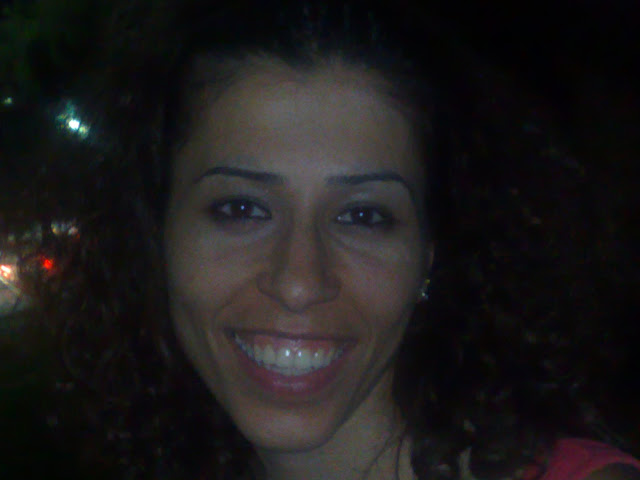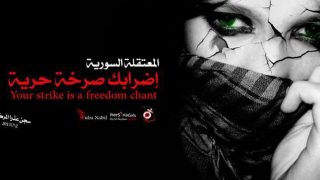This article is the outcome of an ongoing collaboration with the Syrian Female Journalists Network to support Syrian female writers and media professionals.
Psychological and physical abuse of women in security detention centers along with the brutalities committed against them, are unimaginable and intolerable.
Physical and psychological torture techniques are many and varied. The methods used in Syrian jails include the shabeh (hanging someone by the hands with their feet above the floor), “flying carpet” (wooden boards on which the person is fixed while their body is contorted and twisted), electric shocks and many types of beatings. Female prisoners may also be subjected to various forms of sexual harassment and even rape. And then there is psychological torture. Methods range from placing someone in solitary confinement for days or weeks without investigation; leaving her standing for hours in a corridor where other detainees are being tortured while she is blindfolded and terrified in a bid to extort satisfactory confessions through pressure; or threatening her with the arrest of a member of her family or one of her children. These violations are no less brutal than rape.
Since the beginning of the Syrian revolution, intelligence agencies have used rape as a weapon of war to suppress and intimidate demonstrators, both males and females. The regime is well aware of the nature of Syrian society and the importance of some social norms such as those related to masculinity and honor, which are linked to the sister, mother, wife or daughter of the male detainees. As such, the regime has exploited these stereotypes to push society to limit the participation of women in demonstrations just because they might be arrested and sent to detention centers where rape is commonly accepted and practiced. In fact, the regime succeeded in influencing parents and ordinary people and in creating in their minds terrifying images of the consequences of arrest and detention.
Due to the Syrian intelligence’s conscious and intentional exploitation of honor in relation to women, a large proportion of the population, unconsciously and unintentionally, dealt with their daughters and women as if they were the perpetrators rather than the victims of rape.
The regime started with a careful and systematic strategy to which society in general and particularly women fell victim. Society unconsciously assisted the regime by treating women as though they were guilty and responsible for what was forced on them. Women were denied their basic right to go on with their lives normally. On the other hand, society did the regime a great service by remaining silent and forcing this silence upon women who were prevented from sharing their experiences in detention, thus suppressing many testimonies that would have exposed the Syrian regime’s practices and violations against its people; such as war crimes and crimes against humanity.
Holding women responsible for being raped in prison is no less brutal and barbaric than what they experienced and suffered at the hands of security services agents. Many women were divorced by their husbands while they were still being held in the Adraa women’s prison only because they were presumably raped. Others were separated from their children, just because they had been detained. Some women were forcibly married, shortly after they left prison, while others lost the support of their families, and were denied a return to their normal lives simply because they were raped or even thought to be raped.
The women / feminist organizations’ focus on documenting the regime’s crimes including sexual violence against women in detention centers, aims at highlighting and spreading awareness of the fact that these women are victims of the brutal methods of the regime and not accomplices to be held responsible for the atrocities to which they were subjected.
In light of these facts, some of the social norms that were and still are abusive of women must be changed. New concepts, that are not abusive of either men or women, must be elaborated to keep up with the period we are living in and become part of the change that occurred in the cultural and social spheres in Syria since the start of the freedom movement.
To achieve this, we must first focus on the type of discourse (social, political, religious), the group producing it (activist groups, civil society organizations, intellectuals, lawyers) and those targeted by this discourse (sheikhs, tribal leaders, educated/uneducated groups). Second, we must resort to sheikhs and heads of tribes for help in crafting a discourse addressing those with no or basic education. This discourse must make use of simple concepts as well as solid religious proof and evidence. In addition to that, those who are illiterate, and the elderly, must be addressed through appropriate oral discourse.
The role of civil society, human rights, and women’s organizations consists in adopting, promoting, and using this discourse to raise awareness through media, including social media, and the creation of activities that allow for meeting and dialogue between people with different mindsets and cultures. The purpose of such activity is to change these social norms, which are older than the regime and which threaten or disrupt people’s lives.
The campaign of arrests of civilians carried out by the intelligence services does not differentiate between dissidents and neutrals. If you are born in a town that is hostile to the regime and that had witnessed demonstrations against it, then your arrest is probable and so are torture and rape. It makes no difference if you were a man or a woman, young or old. We are all the victims of this despotic, barbaric and fascist regime. Those who have not been arrested are lucky.
As for the survivors of arrest (men in general, and women in particular), we must think of ways to make them feel warm and safe and to support them as they try to return to a normal life. We must also encourage them to remember their experiences and share them as a means of helping them overcome the physical and psychological consequences of torture instead of punishing them just as the regime did.







